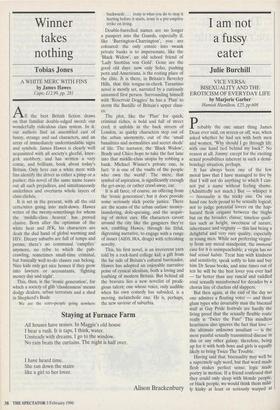Winner takes nothing
Tobias Jones
A WHITE MERC WITH FINS by James Hawes Cape,. £12.99, pp. 281 All the best British fiction draws on that familiar double-edged sword: our wonderfully ridiculous class system. In it, our authors find an assembled cast of funny, strange and sad characters, and an array of immediately understandable signs and symbols. James Hawes is clearly well acquainted with all society's gleeful, knee- jerk snobbery, and has written a very comic, and brilliant, book about today's Britain. Only here can a white merc with fins identify the driver as either a pimp or a pusher; this novel of the same name teases out all such prejudices, and simultaneously underlines and overturns whole layers of class clichés.
It is set in the present, with all the old certainties going into melt-down. Hawes writes of the twenty-somethings for whom the 'middle-class heaven' has proved elusive. Born after the optimism of the white heat and JFK, his characters are dealt the dud hand of global warming and HIV. Dreary suburbs are full of temps and perms; there's no communal 'campfire' anymore, no tribe to which the pub- crawling, sometimes small-time criminal, but basically well-to-do classes can belong. Nice kids only get nice houses if they grow into lawyers or accountants, 'fighting money day and night'.
This, then, is the 'ironic generation', for which a society of glib 'classlessness' means dodgy dealers, urban terrorists and a shed in Shepherd's Bush: We are the retro-people going nowhere
backwards . irony is what you do to stop it hurting before it starts, irony is a pre-emptive strike on living.
Double-barrelled names are no longer a passport into the Guards, especially if, like `Barrington-Charrington', you are coloured: the only entrée into swank private banks is to impersonate, like the `Black Widow', an old school friend of `Lady Snottina von Gold'. Gone are the good old days: now only Soho, pushing porn and Americana, is the resting place of the elite. It is there, in Britain's Beverley Hills, that this tongue-in-cheek Tarantino novel is mostly set, narrated by a curiously unnamed first person. Surrounding himself with 'Reservoir Doggies' he has a 'Plan' to storm the Bastille of Britain's upper class- es: The plot, like the 'Plan' for quick, criminal riches, is bold and full of street cred; it unfolds in the back streets of London, as quirky characters step out of the urban anonymity, out of the 'small banalities and normalities and secret sheds' of life. The narrator, the 'Black Widow', Brady and Chico hope to take the fast lane into that middle-class utopia by robbing a bank. Michael Winner's private one, in fact: 'it is one of the vaults of the people who own the world'. The merc, that symbol of aspiration, is significantly enough the get-away, or rather crawl-away, car.
It is all farce, of course, an offering from the 'ironic generation'; but it does provide some seriously slick poetic justice. There are the scams of the urban outlaw: money- laundering, dole-queuing, and the acquir- ing of stolen cars. His characters cavort around the city like the gangsters they're not, enabling Hawes, through his fitful, digressing narrative, to engage with a range of issues (AIDS, IRA, drugs) with refreshing novelty.
This, his first novel, is an irreverent yarn told by a rock-hard college kid; a gift from the far side of Britain's cultural barricades. Hawes has adopted an enjoyable narrative poise of cynical idealism, both a loving and loathing of modern Britain. But behind all the bravura lies a new novelist of prodi- gious talent; one whose voice, only audible when his own comedy has subsided, is a moving, melancholic one. He is, perhaps, the new saviour of suburbia.


































































 Previous page
Previous page